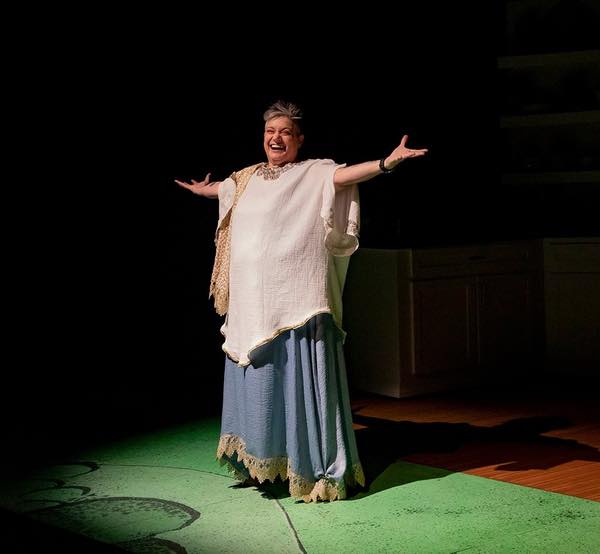Through Sun 2/13
Hurricane Diane, a 90-minute play without intermission, now on stage at Dobama, has been described as “an astonishing new play which whirls ancient myth, lesbian pulp, ecological thriller and The Real Housewives of Monmouth County into a perfect storm of timely tragicomedy.”
The play opens with a delightful monologue in which Diane, a permaculture gardener with supernatural powers, since she is in fact the Greek god Dionysus, explains that she has come for an earthly visit to try and alert the modern world of the needed climate change. She plans to start this by restoring the Earth to its natural state.
Where oh where does Diane decide to start her daunting task? Why, of course, by convincing four New Jersey suburban housewives of the need to get rid of the their well-mowed grass, eliminate their formal gardens and go natural. (“Yeh, shuw, in N’wjoisey. Wha-kind-a nutsy ideur.”)
Her tools of persuasion? Seduction, conjuring up a hurricane complete with blackouts and home destruction, and pitting the women against each other.
Hurricane Diane‘s author, Madeleine George, was a finalist for the Pulitzer Prize for Drama in 2014 and she won the 2016 Whiting Award for Drama. She has been described as “a playwright at home in the messiness of us. She writes rigorously about love and its great sacrifices, and we are pulled to her scenes and words because she will not compromise how complicated we truly are.”
She says of her script, “The question that I was groping towards in this play is I feel like nobody wants to deal with climate change.” She goes on, “My partner was telling me that when she was at the Women’s March, some people got up at the rally, after the rally was kind of cooking, and started talking about climate change and the place emptied out. Everybody is just like, ‘Nope, nope. Can’t.’ Nobody wants to think about it, nobody wants to talk about it. It feels like it’s just going to be like somebody hitting you with a slab of concrete and there’s nothing you can do.”
She has developed a script which may confound many who want to dig beyond the obvious topic of the need to be aware and do something about climate change. It is full of laughs, elicits gasps and carries an important message.
As Nathan Motta, Dobama’s artistic director, states in his program notes, “Climate change is no joke. The devastating effects of drought and flood, fires and storms, threaten human lives now and in the future. It’s an epic problem now and in the future.” He goes on to state that it is hard to get people to listen to the message, but Madeleine George has found a way to get the audience involved by using laughter to put the audience at ease and make the experience wildly enjoyable, so that we let our guard down.
Dobama’s production is compelling. It is well-conceived, well-cast and technically masterful. The ensemble cast is flawless. Each character is well-conceived. Aimee Collier, who has received recognition from both the Cleveland Critics Circle and Broadwayworld.com for her performance excellence, is other-world perfect as Diane. She has a keen sense of comic timing and is bigger than life in transforming herself into a real “dyke” god.
Lara Melcarei (Pam Annunziata) is nothing short of perfect “Nujoisee-centric.” Complete with lots of jewelry, overdone makeup, ostentatious clothing and a stereotypical loud whine, she screams “lady of the garden state.”
Natalie Green showcases her talent for getting into the mind of the characters she portrays by accurately creating Beth Wann as a woman who lacks self-pride and an understanding of her personal worth. Green allows us to see, hear and feel Beth’s pain.
Renee Shapiro-Epps is written as a strong, black, successful woman. As created by Coleen Longshaw, Renee’s vulnerability also becomes clear. It is obvious why Longshaw has had a successful career in professional theater.
Lana Sugarman has perfectly nailed the persona of the uptight, “what will the neighbors think,” insecure Carol Fleischer.
Director Shannon Sindelar again displays her creativity and ability to take the written word and create a living entity of the script. She has selected a well-balanced cast and molded the performers and technical aspects into a play worth seeing.
The one thing Sindelar was not able to conquer is Dobama’s newly conformed performance space. The soccer-field length stage makes it impossible for everyone to consistently hear and connect with the performers. The former arrangement, which was a three-quarter round configuration, left those seated on the extreme sides isolated and not hearing clearly. This new configuration is probably worse, as no one is in a consistent hear-and-react zone. Motta and his staff need to go back to the drawing board!
Jill David has created a good set design. The upscale kitchen, in front of a long wall of painted duplicate cul-de-sacs, is a perfect image of New Jersey suburbs. Kevin Duchon’s lighting design carries us from warm and comfortable suburban kitchen to a hurricane-like atmosphere and isolation. Megan Culley’s sound design is astounding. It creates music and sounds that carry us through the emotional segments of the performance.
CAPSULE JUDGMENT: Hurricane Diane is a well-written script which gets a topnotch production at Dobama. Sit back, appreciate fine acting and topnotch tech work, as you hopefully learn about the need for all of us to work to curb climate change. You might also conjure up a more audience-friendly configuration for the Dobama performance space.
Hurricane Diane runs through February 13. For tickets go to dobama.org or call 216-932-3396.
[Written by Roy Berko]
